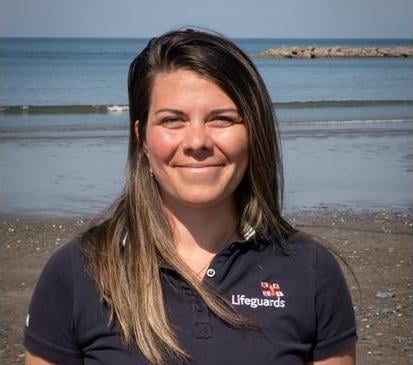A couple credit the RNLI’s Float to Live advice with helping to save their lives when they found themselves in serious danger in the sea.
The lifesaving charity is reminding the public to remember the Float technique when visiting the coast this summer.
New research has found 84% of people in Wales plan on visiting the coast this summer and that 72% of people would not try to float as their first action if in trouble in the water.
Katie Laurie and Will Peckham were swept off their feet by a wave whilst in the sea at Borth Beach in 2022. They were quickly swept around 40m out to sea by a rip current. They tried to swim to shore but couldn’t fight the strong current and were being pushed under by the waves.
Katie said: “After the wave went over us, we couldn’t get away, it was pulling us out and the shore was getting further away. Being pushed under by the water wore me out – every time I got back up, the waves would push me down again. It was like being in a washing machine. All we could do was fight enough to breathe.”
The couple were becoming exhausted and feared for their lives, when Katie remembered the float to live advice she had seen on a poster at the beach entrance. She shouted to Will to try and float.
Floating helped the couple regain their breath and keep their heads above water until the RNLI lifeguards reached them and took them to safety.
Katie continued: “I was running out of energy to tread water – I was racking my brain for ways not to die, then I remembered I’d seen a sign with the float to live advice. Whoever put that sign at the beach entrance is a hero.

“I was exhausted by the time we were rescued. The lifeguards had been struggling against the conditions and I was worried about what would happen if they couldn’t reach us. But when they started getting nearer, I started to hope we would be alright. I don't remember much of the ride back – by then I was exhausted. When I got out of the sea, I couldn't walk unaided.
“I don't think I would have lasted without floating – the float to live technique really did help to save me.”
Tirion Dowsett RNLI Water Safety Delivery Support said: “Katie and Will prove how valuable the RNLI’s Float to Live advice is. In a life-threatening situation, Katie fortunately remembered our advice and it kept them safe until the RNLI lifeguards arrived to rescue them.
“This year we’re encouraging people to practice the float technique to find your float in a swimming pool or supervised body of water – like the red and yellow flags at a lifeguarded beach.
“People float in different ways. Being familiar with the technique which works best for you is important in case you need to use it in a real-life situation.

“If you see someone in difficulty in the water, encourage them to Float to Live and always call 999 or 112 and ask for the Coastguard. We strongly advise against entering the water to assist. Our volunteer RNLI lifeboat crews are on call 24/7 to come to your aid.”
The RNLI’s advice for anyone in trouble in the water is to Float to Live:
· Tilt your head back with your ears submerged
· Relax and try to breathe normally
· Move your hands and legs to help you stay afloat
· It’s ok if your legs sink, we all float differently
· Practice floating in a local pool if you can




Comments
This article has no comments yet. Be the first to leave a comment.